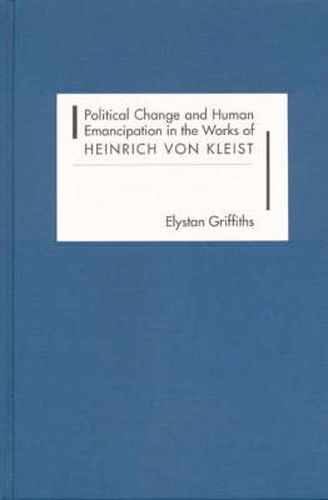Readings Newsletter
Become a Readings Member to make your shopping experience even easier.
Sign in or sign up for free!
You’re not far away from qualifying for FREE standard shipping within Australia
You’ve qualified for FREE standard shipping within Australia
The cart is loading…






The German writer Heinrich von Kleist (1777-1811) was an unconventional and often controversial figure in his own day, and has remained so. His ideas on art, politics, and gender relations continue to challenge modern readers, and his complex and radically open texts remain the object of vigorous scholarly debate. Kleist has often been portrayed as a poet without a society, whose writing served as escape from the realities of his social environment. This new study challenges such a view by situating Kleist in relation to the central political and philosophical debates of his momentous age. The study first establishes the German-and Prussian-context of Kleist’s day, and then provides a short introduction to Kleist’s life, here seen in particular relation to the political world. Developing his argument in relation to Kleist’s literary work and essays in a series of close readings, Elystan Griffiths shows how Kleist’s writings responded to four pressing political issues: the relationship of national culture and the state; education and social reform; the theory and practice of war; and administration and the delivery of justice. Griffiths sheds fresh light on Kleist’s writing by placing emphasis on its intricacy and rich ambiguity, which are often simplified or overlooked in political studies of Kleist. Thus Griffiths furthers the critical understanding of Kleist’s political thinking by uncovering crucial tensions between a pragmatic readiness for compromise and a utopian longing for freedom and truth.Elystan Griffiths is a Research Fellow in the Department of German Studies at the University of Birmingham.
$9.00 standard shipping within Australia
FREE standard shipping within Australia for orders over $100.00
Express & International shipping calculated at checkout
The German writer Heinrich von Kleist (1777-1811) was an unconventional and often controversial figure in his own day, and has remained so. His ideas on art, politics, and gender relations continue to challenge modern readers, and his complex and radically open texts remain the object of vigorous scholarly debate. Kleist has often been portrayed as a poet without a society, whose writing served as escape from the realities of his social environment. This new study challenges such a view by situating Kleist in relation to the central political and philosophical debates of his momentous age. The study first establishes the German-and Prussian-context of Kleist’s day, and then provides a short introduction to Kleist’s life, here seen in particular relation to the political world. Developing his argument in relation to Kleist’s literary work and essays in a series of close readings, Elystan Griffiths shows how Kleist’s writings responded to four pressing political issues: the relationship of national culture and the state; education and social reform; the theory and practice of war; and administration and the delivery of justice. Griffiths sheds fresh light on Kleist’s writing by placing emphasis on its intricacy and rich ambiguity, which are often simplified or overlooked in political studies of Kleist. Thus Griffiths furthers the critical understanding of Kleist’s political thinking by uncovering crucial tensions between a pragmatic readiness for compromise and a utopian longing for freedom and truth.Elystan Griffiths is a Research Fellow in the Department of German Studies at the University of Birmingham.